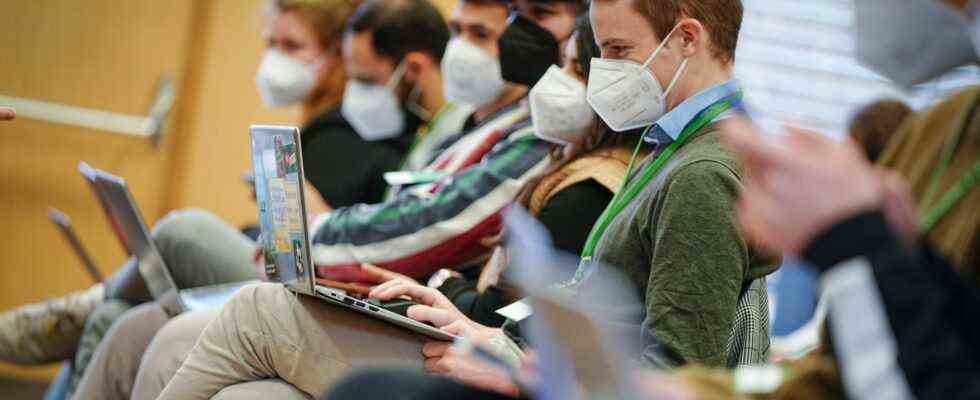Status: 11/27/2021 11:37 PM
Not social enough, not left enough – the coalition agreement negotiated with the SPD and FDP does not spark any real enthusiasm among the Green Youth. Nevertheless, she does not want to oppose the coalition agreement.
A clever woman once told her that you have to make compost out of shit, says Pia Scholten from Lower Saxony, describing her uneasy feeling since the coalition agreement between the Greens, SPD and FDP was presented this week. There is no sign of traffic light euphoria among the Green Youth and that is not due to the corona pandemic. It is the coalition agreement that for the 50 or so participants in the hybrid state council is too vague, too little social and too little left-wing in many places.
But the Green Youth does not want to oppose the coalition agreement. After a controversial substantive debate, in which there was a lot of criticism but no total rejection, the committee recommends approving the joint government paper in the basic survey with only three abstentions. The traffic light made up of the SPD, the Greens and the FDP is seen as the only alternative to the business-as-usual policy of the past decades.
Green youth wanted an alliance with the SPD and the left
It is a bitter pill for the Green Youth, who had hoped for a left alliance with the SPD and the left after the federal election. We weren’t strong enough to organize a left-wing political majority, regrets federal spokeswoman Sarah-Lee Heinrich. She sees clear improvements in many areas in the coalition agreement. But it does not do justice to social needs, with the climate crisis and the social division of society. Heinrich speaks of the first correct steps if a basic security for children and young people is introduced now. But that must go hand in hand with a review and increase in the standard rates. The new citizens’ money, which is to replace Hartz IV, also needs standard rates above the subsistence level.
Heinrich tears come at these words. She grew up in a Hartz IV family. She knows the problems and communicates them regularly. The deputy federal chairman of the Greens, Ricarda Lang, promises at the state council that the party will continue to fight for socio-political improvements within the desired government with the SPD and FDP. “This coalition agreement is not suddenly our party position,” explains Lang, who is invited to explain the results of the coalition negotiations. In the next four years, the Greens should not allow themselves to be reduced to the eco role, she warns.
Criticism of the FDP-led Ministry of Transport
The climate in general: In the coalition negotiations, the Greens negotiated a massive expansion of renewable energies and an earlier coal phase-out. That finds respect. Nevertheless, doubts are repeatedly raised as to whether the 1.5 degree target can still be achieved.
Timon Dzienus, the second federal spokesman for the Green Youth, is already asking the traffic light to make improvements if there is not enough progress in climate protection. The Paris climate target to limit global warming is “definitely more important than compliance with the coalition agreement.”
The Ministry of Transport, which the FDP received, is also viewed with skepticism. Will it keep building highways? And are all construction projects really being re-examined? The coalition agreement states that at least 15 million fully electric cars should be registered by 2030. This is not the turnaround in traffic that the Green Youth are hoping for.
Sociopolitical “in the fast lane”
But there is also a big sigh of relief. “Hopefully, our generation will soon be able to vote at the age of 16, be informed about abortions, determine their gender and smoke weed legally,” says Annabell Sola from the Ludwigshafen district association. These are successes that have made her aware of the opportunities the Union has withheld from young people for many years.
“Socio-politically, this coalition agreement is driving in the fast lane towards the present,” praised the Berlin-based Kasimir Heldmann. The Brandenburg spokeswoman Antonia Baumgarten reminds of the still existing differences between East and West. Even more than 30 years after German reunification, there are differences in income and in the representation of East Germans in important positions and offices. This is not an invention of the Ampel coalition, but an open promise made by the previous governments.
125,000 Greens decide by ballot
The minimum wage of 12 euros per hour and the basic security could ensure a big leap. “The Greens have four extremely exhausting years ahead of their chests,” says Scholten. The height of fall is high. She comes back to her comparison: “We just want to make compost out of shit.”
Two months after the federal election, the SPD, Greens and FDP presented their coalition agreement to the public on Wednesday. What was negotiated behind closed doors and in unprecedented silence should now also be confirmed by the members of the future governing parties. SPD and FDP will vote at party congresses at the beginning of the coming weekend. The approximately 125,000 Greens decide this by means of a ballot. You can vote online or by post until December 6th. A minimum participation is not provided.
Green enough? The Green Youth discussed the coalition agreement
Angela Tesch, ARD Berlin, November 27, 2021 10:25 p.m.

